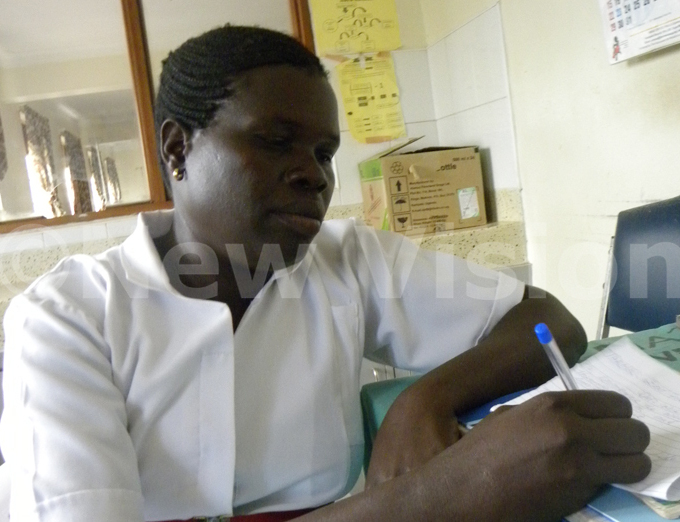Fistula; Faidah was saved from a decade of shame
May 31, 2016
She kept shifting on the bed, checking under her skirt, just to make sure it was indeed no more. With every check came a grin, first small then wider. She was over the moon. "Fistula gone!" she exclaims in whatever scanty English she thinks will help convey her message.

Comfort Faidah could not hide her joy. From ear to ear to she grinned; her burden was no more. She kept shifting on the bed, checking under her skirt, just to make sure it was indeed no more. With every check came a grin, first small then wider. She was over the moon. "Fistula gone!" she exclaims in whatever scanty English she thinks will help convey her message.
The reflex checking of her skirt was to make sure that it indeed it as not wet, after battling obstetric fistula for nearly a decade. "I'm very happy!" she shouts, this time opting to check her bed-sheet instead. When she finds that it is also dry, and that the fistula that had left her passing urine uncontrollably for a decade was no more, she smiles! "I am going to take six cups of tea!" she manages in again, a bit shaky English but is not afraid to speak.

Her smile is infectious, her mother and sister soon join in the jubilation, as does the midwife, at the Arua Regional Referral hospital where a United Nations Population Fund organised fistula repair camp took place recently. "I'm being suffering…no friend…now my bed is dry!" she cries out. This is just before she thanks UNFPA, government, all the nurses and doctors and basically everything and everyone that comes to mind.
But who can blame her? The 24-year-old school dropout who had a tear after the birth of her baby eight years ago after the birth of her baby eight years ago has not been able to hold a job. It is bad enough the ordeal which left her with a fistula, also claimed her baby's life and left her with years of agony. "Thank you…thank you!" she says to everyone in the room.
Jessica Asikuru, a midwife at the hospital said that what Faidah had was a vesico-vaginal fistula (VVF). "This is a tear that occurs during child birth between the vaginal and the bladder," she explains. She said that that tear causes one's bladder to leak urine uncontrollably, and leaves its victims a centre of ridicule. "That is why we celebrate with them when they are happy, because it is a very trying experience!" She said that many a time,fistulas are caused by delays to get all the necessary assistance when labor commences.
Globally, UNFPA places the number of women living with the condition at 3.5 million, with an estimation of about 50,000-100,000 new cases occurring annually. Most of these are in Sub-Saharan Africa and Asia, with Uganda having 1,900 new cases of fistula each year. Currently, the health ministry estimates that 200,000 women are known victims of the condition.
In a speech to commemorate the International Day to End Obstetric Fistula, Esperance Fundira, the UNFPA country representative, was joyed that Uganda, is taking the cause seriously. "This is the Fourth time Uganda is commemorating the day after the UN General Assembly designated May 23 as the International Day to End Obstetric Fistula in November 2012," she said. "I thank the Government of Uganda for honouring the UN resolution and putting the reproductive health and rights of women and girls on the national development agenda."
She said that every day, in Uganda, almost 16 women die from pregnancy complications. "For every woman who dies, 6-15 or more are injured or disabled!" she exclaimed. "One of the most serious injuries of childbearing is obstetric fistula, a hole in the birth canal, caused by prolonged, obstructed labour due to lack of timely and adequate medical care."
Fundira noted that the persistence of obstetric fistula reflects broader health inequities and health-care system constraints, as well as wider challenges facing women and girls, such as poverty, gender inequality, lack of schooling, child marriage and teenage pregnancies, all of which impede the well-being of women and girls.
"Obstetric Fistula afflicts those who lack access to the timely, high-quality, and life-saving maternal health care that they so desperately need and deserve, and that is their basic human right," she explained. "I am personally outraged that fistula, which is wholly preventable, still occurs in today's world."
In a speech to commemorate the fistula day, outgoing Minister of State for Primary Health Care, Sarah Opendi, acknowledged that there was a problem, but an even bigger one at hand due to the fact that country only had 25 fistula surgeons countrywide. "The ministry is going to equip Mulago National Referral Hospital, the different regional referral hospitals and selected private non-profit hospitals to build capacity for functional obstetric fistula treatment sites to deal with the backlog," she said.
